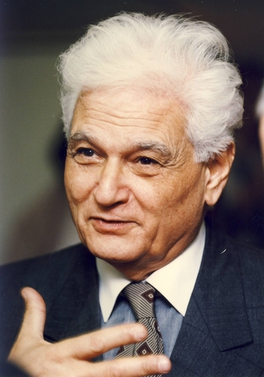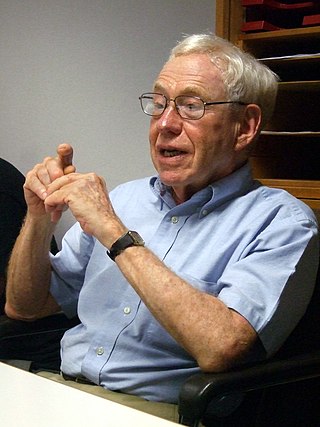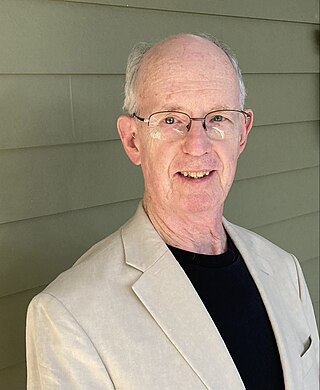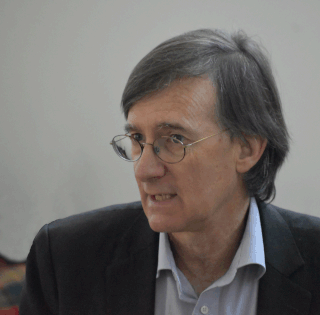
Posthumanism or post-humanism is an idea in continental philosophy and critical theory responding to the presence of anthropocentrism in 21st-century thought. Posthumanization comprises "those processes by which a society comes to include members other than 'natural' biological human beings who, in one way or another, contribute to the structures, dynamics, or meaning of the society."

Jacques Derrida was a French philosopher. He developed the philosophy of deconstruction, which he utilized in a number of his texts, and which was developed through close readings of the linguistics of Ferdinand de Saussure and Husserlian and Heideggerian phenomenology. He is one of the major figures associated with post-structuralism and postmodern philosophy although he distanced himself from post-structuralism and disowned the word "postmodernity".

Hermeneutics is the theory and methodology of interpretation, especially the interpretation of biblical texts, wisdom literature, and philosophical texts. As necessary, hermeneutics may include the art of understanding and communication.

Hubert Lederer Dreyfus was an American philosopher and a professor of philosophy at the University of California, Berkeley. His main interests included phenomenology, existentialism and the philosophy of both psychology and literature, as well as the philosophical implications of artificial intelligence. He was widely known for his exegesis of Martin Heidegger, which critics labeled "Dreydegger".

Peter Sloterdijk is a German philosopher and cultural theorist. He is a professor of philosophy and media theory at the University of Art and Design Karlsruhe. He co-hosted the German television show Das Philosophische Quartett from 2002 until 2012.

Joseph Raz was an Israeli legal, moral and political philosopher. He was an advocate of legal positivism and is known for his conception of perfectionist liberalism. Raz spent most of his career as a professor of philosophy of law at Balliol College, Oxford, and was latterly a part-time professor of law at Columbia University Law School and a part-time professor at King's College London. He received the Tang Prize in Rule of Law in 2018.

Reiner Schürmann was a philosopher and professor. From 1975 to his death, he was Professor of Philosophy at The New School for Social Research in New York City. He wrote all his major published work in French.
Shannon Bell is a Canadian performance philosopher who lives and writes philosophy-in-action, experimental philosophy. Bell is also professor and graduate programme director in the York University Political Science Department, Toronto, Ontario, Canada. She teaches postmodern theory, fast feminism, sexual politics, cyber politics, identity politics and violent philosophy.

Rosi Braidotti is a contemporary philosopher and feminist theoretician. Born in Italy, she studied in Australia and France and works in the Netherlands. Braidotti is currently Distinguished University Professor Emerita at Utrecht University, where she has taught since 1988. She was professor and the founding director of Utrecht University's women's studies programme (1988-2005) and founding director of the Centre for the Humanities (2007-2016). She has been awarded honorary degrees from Helsinki (2007) and Linkoping (2013); she is a Fellow of the Australian Academy of the Humanities (FAHA) since 2009, and a Member of the Academia Europaea (MAE) since 2014. Her main publications include Nomadic Subjects (2011) and Nomadic Theory (2011), both with Columbia University Press, The Posthuman (2013), Posthuman Knowledge (2019), and Posthuman Feminism (2022) with Polity Press. In 2016, she co-edited Conflicting Humanities with Paul Gilroy, and The Posthuman Glossary in 2018 with Maria Hlavajova, both with Bloomsbury Academic.
Robert L. Bernasconi is Edwin Erle Sparks Professor of Philosophy at Pennsylvania State University. He is known as a reader of Martin Heidegger and Emmanuel Levinas, and for his work on the concept of race. He has also written on the history of philosophy.
Babette Babich is an American philosopher who writes from a continental perspective on aesthetics, philosophy of science, especially Nietzsche's, and technology, especially Heidegger's and Günther Anders, in addition to critical and cultural theory.

Michael E. Zimmerman is an American philosopher, integral theorist, author, and academic. He is a Professor Emeritus of Philosophy for Tulane University and University of Colorado at Boulder.

Jeff Malpas is an Australian philosopher and emeritus distinguished professor at the University of Tasmania in Hobart. Known internationally for his work across the analytic and continental traditions, Malpas is also at the forefront of contemporary philosophical research on the concept of "place", as first and most comprehensively presented in his Place and Experience: A Philosophical Topography—now in its second edition—and further developed in numerous subsequent works.
Nader El-Bizri served as the Dean of the College of Arts, Humanities, and Social Sciences at the University of Sharjah. He was before that a tenured longstanding full Professor of philosophy and civilization studies at the American University of Beirut, where he also acted as an Associate Dean of the Faculty of Arts and Sciences, and as the Director of the General Education program. El-Bizri specializes in phenomenology, Islamic science and philosophy, and architectural theory. He is the author or editor of several books, including The Phenomenological Quest between Avicenna and Heidegger (2000).
Michael Friedman is an American philosopher who serves as Suppes Professor of Philosophy of Science and Professor, by courtesy, of German Studies at Stanford University. Friedman is best known for his work in the philosophy of science, especially on scientific explanation and the philosophy of physics, and for his historical work on Immanuel Kant. Friedman has done historical work on figures in continental philosophy such as Martin Heidegger and Ernst Cassirer. He also serves as the co-director of the Program in History and Philosophy of Science and Technology at Stanford University.
The College of Arts and Sciences (A&S) is the liberal arts and sciences unit of the University of Kentucky, located in Lexington, Kentucky. It is primarily divided between the natural sciences, social sciences, and humanities, and offers more than thirty degree options for both undergraduate and graduate students.

Winfried Reinhard Dallmayr was an American philosopher and political theorist. He was Packey J. Dee Professor Emeritus in Political Science with a joint appointment in philosophy at the University of Notre Dame (US). He held a Doctor of Law from the Ludwig Maximilian University of Munich, and a PhD in political science from Duke University. He was the author of some 40 books and the editor of 20 other books. He served as president of the Society for Asian and Comparative Philosophy (SACP); an advisory member of the scientific committee of RESET – Dialogue on Civilizations (Rome); the executive co-chair of World Public Forum – Dialogue of Civilizations (Vienna), and a member of the supervisory board of the Dialogue of Civilizations Research Institute (Berlin).
Peter Eli Gordon is an American historian of philosophy, a critical theorist, and intellectual historian. The Amabel B. James Professor of History and Faculty Affiliate in the Department of Philosophy at Harvard University, Gordon focuses on continental philosophy and modern German and French thought, with particular emphasis on the German philosophers Theodor Adorno and Martin Heidegger, critical theory, continental philosophy during the interwar crisis, and most recently, secularization and social thought in the 20th century.

Harold Vincent Poor FRS FREng is the Michael Henry Strater University Professor of Electrical Engineering at Princeton University, where he is also the Interim Dean of the School of Engineering and Applied Science. He is a specialist in wireless telecommunications, signal processing and information theory. He has received many honorary degrees and election to national academies. He was also President of IEEE Information Theory Society (1990). He is on the board of directors of the IEEE Foundation.
Joan Callahan was a Professor Emerita of Philosophy at the University of Kentucky, an institution where she taught for more than twenty years and served in a variety of roles, including as director of the Gender and Women's Studies Program. Callahan's research has focused on feminist theory, critical race theory, ethics, social and political philosophy, the philosophy of law, and on the junctions of these topics.











